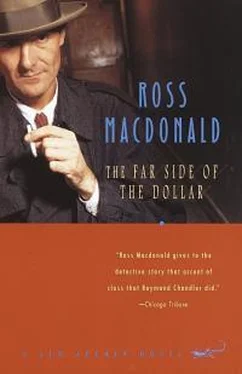I said, partly because I wanted to, and partly to appease her: “You must have been a very beautiful girl.”
“Yes. I was.”
She seemed to take no pleasure even from her vanity. I began to suspect that she didn’t relate to men. It happened sometimes to girls who were too good-looking. They were treated as beautiful objects until they felt like that and nothing more.
“I could have married anybody,” she said, “any man I went to college with. Some of them are bank presidents and big corporation executives now. But I had to fall in love with a football player.”
“Your husband is a little more than that.”
“Don’t sell him to me,” she said. “I know what he is, and I know what my life has been. I’ve been defrauded. I gave everything I had to marriage and motherhood, and what have I got to show for it? Do you know I never even saw my grandson?”
Mrs. Harley had said the same thing. I didn’t mention the coincidence.
“What happened to your grandson?”
“Carol put him out for adoption, can you imagine? Actually I know why she did it. She didn’t trust her husband not to harm the baby. That’s the kind of a man she married.”
“Did she tell you this?”
“More or less. Mike is a sadist, among other things. He used to swing cats by their tails. He lived in this house for over a year and all the time I was afraid of him. He was terribly strong, and I never was certain what he was going to do.”
“Did he ever attack you?”
“No. He never dared to.”
“How old was he when he left?”
“Let me see, Carol was fifteen at the time. That would make him seventeen or eighteen.”
“And he left to join the Navy, is that correct?”
“He didn’t go into the Navy right away. He left town with an older man, a policeman who used to be on the local force. I forgot his name. Anyway, this man lost his position on the force through bribery, and left town, taking Mike with him. He said he was going to make a boxer out of him. They went out to the west coast. I think Mike joined the Navy a few months later. Carol could–” She stopped in dismay.
“What about Carol?”
“I was going to say that Carol could tell you.”
The angry smile twisted and insulted her mouth. “I must be losing my mind.”
“I doubt that, Mrs. Brown. It takes time to get used to these shocks and changes.”
“More time than I have. More time than I’ll ever have.”
She rose impatiently and went to the mantelpiece. One of the trophies standing on it was out of line with the others. She reached up and adjusted its position. “I wonder what Rob thinks he’s doing in the kitchen.”
She didn’t go and find out what he was doing. She stood in an awkward position, one hip out, in front of the empty fireplace. Under the dowdy black dress, the slopes and masses of her body were angry. But nothing that she could do with her body, or her face, could change the essential beauty of the structure. She was trapped in it, as her daughter had been.
“I wish you’d go on with your story, Mrs. Brown.”
“It hardly qualifies as a story.”
“Whatever you want to call it, then. I’m very grateful for the chance to talk to you. It’s the first decent chance I’ve had to get any information about the background of this case.”
“The background hardly matters now, or the foreground either.”
“It does, though. You may tell me something that will help me to find Harley. I take it you’ve seen him and Carol from time to time over the years.”
“I saw him just once more – after that, I wouldn’t give him house room when he came home from the Navy in the winter 1944-45. He claimed to be on leave. Actually he was absent without leave. He talked himself back into Rob’s good graces. Rob had been terribly let down when he left town with that ex-policeman, the bribery artist. But my gullible husband fell for his line all over again. He even gave him money. Which Mike used to elope with my only daughter.”
“Why did Carol go with him?”
She scratched at her forehead, leaving faint weals in the clear skin. “I asked her that, the last time she was home, just a couple of months ago. I asked her why she went and why she stuck with him. She didn’t really know. Of course she wanted to get out of Pocatello. She hated Pocatello. She wanted to go out to the coast and break into the movies. I’m afraid my daughter had very childish dreams.”
“Girls of fifteen do.”
With a pang, I thought of Stella. The pang became a vaguely formed idea in an unattended area of my mind. Generation after generation had to start from scratch and learn the world over again. It changed so rapidly that children couldn’t learn from their parents or parents from their children. The generations were like alien tribes islanded in time.
“The fact is,” I said, “Carol did make it into the movies.”
“Really? She told me that once, but I didn’t believe her.”
“Was she a chronic liar?”
“No. Mike was the chronic liar. I simply didn’t believe that she could succeed at anything. She never had.”
The woman’s bitterness was getting me down. She seemed to have an inexhaustible reservoir of the stuff. If she had been like this twenty years before, I could understand why Carol had left home at the first opportunity, and stayed away.
“You say you saw Carol just a couple of months ago.”
“Yes. She rode the bus from Lake Tahoe in June. I hadn’t seen her for quite a long time. She was looking pretty bedraggled. God knows what kind of a life he was leading her. She didn’t talk much.”
“It was a chancy life. Harley seems to have lost his job, and they were on their uppers.”
“So she told me. There was the usual plea for money. I guess Rob gave her money. He always did. He tried to pretend afterwards, to me, that he gave her the car, too, but I know better. She took it. Apparently their old car had broken down, and they couldn’t live at Tahoe without a car.”
“How do you know she took it if your husband says she didn’t?”
She showed signs of embarrassment. “It doesn’t matter. They were welcome to the car.”
It was her first generous word. She half-spoiled it: “We needed a new one, anyway, and I’m sure she did it on the spur of the moment. Carol always was a very impulsive girl.
“The point is,” she said, “she left without saying goodbye. She took the car to go downtown to the movies and simply never came back. She even left her suitcase in her room.”
“Had there been trouble?”
“No more than the usual trouble. We did have an argument at supper.”
“What about?”
“My grandson. She had no right to put him out for adoption. She said he was her baby to do with as she pleased. But she had no right. If she couldn’t keep him, she should have brought him to us. We could have given him opportunities, an education.”
She breathed heavily and audibly. “She said an unforgivable thing to me that evening. She said, did I mean the kind of opportunities she had? And she walked out. I never saw her again. Neither did her father.”
Her head jerked forward in emphatic affirmation: “We did give her opportunities. It’s not our fault if she didn’t take advantage of them. It isn’t fair to blame us.”
“You blame each other,” I said. “You’re tearing each other to pieces.”
“Don’t give me that sort of talk. I’ve had enough of it from my husband.”
“I’m merely calling your attention to an obvious fact. You need some kind of intermediary, a third party, to help straighten out your thinking.”
“And you’re electing yourself, are you?”
“Far from it. You need an expert counselor.”
“My husband is a counselor,” she said. “What good has it done him? Anyway, I don’t believe in seeking that kind of help. People should be able to handle their own problems.”
Читать дальше












